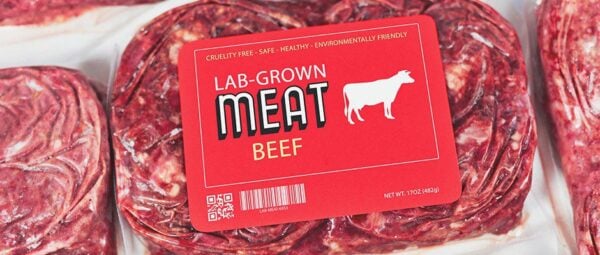This article originally appeared on Leo Hohmann’s Substack and was republished with permission.

The world’s largest meat-processing company, Brazil-based JBS S.A., has announced plans to construct the world’s largest cell-cultured, meat plant in San Sabastian, Spain.
The factory will be built by Bio Tech Foods, a JBS subsidiary which has obtained the support of the Spanish Institute for Foreign Trade to research and cultivate these cell lines for production, according to a report by the Northern Ag Network.
JBS said in a press release:
“In this line, the project led by Bio Tech Foods, ‘Research on cell lines, cultured media and biomaterials for their correct bioprocessing to enable the production of cultivated meat ‘(investMEAT)’ will allow a highly efficient cultivated meat production line, which will solve the challenges of current technology linked to scalability.”
The news broke during the Wyoming Stockgrowers Association annual meeting last week.
Reuters reported that the factory will be capable of producing more than 1,000 metric tons of cultivated beef per year and “JBS said it could expand capacity to 4,000 metric tons per year in the medium term.”
Eduardo Noronha, JBS USA’s head of value-added business, said the new Bio Tech plant puts JBS in a unique position to lead the world’s burgeoning lab-grown meat business and ride this wave of innovation.
Bio Tech Foods co-founder and CEO Iñigo Charola added in a statement: “With the challenges imposed on global supply chains, cultivated protein offers the potential to stabilize food security and global protein production.”
JBS owns a large segment of the U.S. meat-processing industry and some of this lab-grown meat is likely to make its way from Spain to the U.S. and other countries.
This will be the world’s answer to increasing global famine, much of which is created by the very sustainable development measures that they say will save the earth and humanity. They will actually destroy both if allowed.
U.S. beef cattle herds are currently at their lowest levels since 1962 and beef is getting more expensive by the day as a result of the historically low stocks. Farmers have slaughtered off much of their herds because they can’t afford to feed them with the rising prices of corn.
The massive fake-meat factory in Spain is scheduled to go online in mid-2024.
One of the ways these “innovators” are able to grow cultured fake meat so fast is by harnessing the replicating ability of animal cancer cells.
National Cattlemen’s Beef Association President Todd Wilkinson, commenting on the news of JBS’ latest project, told Northern Ag Network that this move is one of the biggest to face the meat industry.
Wilkinson said, “We’ll gladly compete against that, but the consumer needs to know at the counter what they’re buying. I just don’t want the beef industry to go by way of what happened to milk and lose the ability to identify our product as unique and natural. They can say that it’s designed to feed the world, but it’s feeding the world a non-natural product and it’s a product that is going to require more energy to produce, and don’t tell me it’s sustainable.”
JBS has taken a lot of heat from climate activists for sourcing meat from farms that “contribute to the destruction of the Amazon rainforest.”
In a world gone crazy with the obsession to eliminate carbon, this fake-meat initiative is likely its way of buying back some carbon credits to offset its negative impact on the environment, even though, as Wilkinson alludes, it takes even more energy to produce meat in a lab than it does on an actual farm.
According to Northern Ag Network, Wilkinson testified before a subcommittee of the U.S. Senate on October 19, 2019, and explained then how the climate radicals were going to try to destroy the American cattle industry. Then, after the destruction is well under way, they will come in with their answer to the problem: fake meat.
Wilkinson, a South Dakota cattle rancher, told the subcommittee that contrary to the claims of some environmental and anti-animal-agriculture activists, “American beef production and consumption is a climate change solution.”
“Climate policies that unfairly target cattle producers fail to recognize the positive role of cattle and beef in a healthy, sustainable food system,” Wilkinson told members of the U.S. Senate’s Environment and Public Works Subcommittee on Clean Air and Nuclear Safety. “Rather than adopting misguided policies that threaten the viability of farmers and ranchers, we want to shift the conversation.”
Norther Ag reported that, in his testimony, Wilkinson discussed the environmental benefits of grazing, and busted myths about the effect of methane on global climate.
“(Grazing) naturally sequesters carbon, a benefit compounded by ruminant grazing,” Wilkinson explained. “Grazing builds deep root systems in prairie grasses, which improve soil health. Healthy soils retain more water, sequester more carbon, and increase the resiliency of our ranches.”
“Methane emissions from cattle are part of the natural methane cycle,” Wilkinson continued. “Within 10 years, more than 90 percent of that methane combines with oxygen in the atmosphere and converts to CO2. Methane has no long-term impact on climate when emissions and oxidation are in balance. And this balance has been maintained for centuries.”
Bottom line: We know grass-fed, farm-raised beef, consumed for thousands of years, is safe and health for human consumption as long as it’s kept free from dangerous Pharmaceutical products, including mRNA “vaccines.” We know nothing about the health effects of lab-grown meat over the short, medium or long terms.
Just say no to the technocratic elites peddling fake meat and insects to the masses while they continue to dine on the finest cuts of beef.
The post Global Food-Processing Giant Announces World’s Largest Lab-Grown Meat Facility to be Built in 2024 appeared first on The Gateway Pundit.